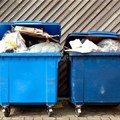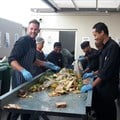Effective waste management is a universal problem that affects us all. It's the one factor we, in the hospitality industry, can collectively prevent from worsening during 2020.

Image Supplied.
While effective waste management ties into the burgeoning 'green travel' market, the underlying message I’d like to emphasise is that it’s not about tapping into a trend or trying to reduce operating costs. Rather, it’s about regarding waste production as a global problem affecting everyone.
According to Worldbank.org, the world’s cities will generate around 3.40 billion tonnes of waste by 2050 – a staggering 70% increase from 2017.
Closer to home, waste is a continual problem. The National Waste Information Baseline (NWIB) cites 108 million tonnes of waste generated in 2011, with an estimated 10% of the total waste stream being recycled, the remaining 90% going into landfill.
Not perfect, but better
While it’s important for industry stakeholders to get proactive and start taking more responsibility for waste production in 2020, we don’t need to wait for the 'perfect' solution.
This is a lesson we’ve learned through our own waste management journey at Dream Hotels & Resorts. We’ve also learned how aiming for absolute perfection can get in the way of smaller, yet more effective improvements that are more readily available.
Recognising that our collection of 23 properties are located in eco-sensitive areas, a strategic decision was made back in 2013 to minimise our impact on the environment.
We quickly realised our goals needed to be realistic and doable. We also needed help, which is why we enlisted the assistance of Energy Resource Optimisers (ERO) to develop a sustainable energy management programme our on-site teams could implement easily.
While a custom sustainability programme would be ideal for most brands or portfolios of properties, SMMEs should not underestimate the impact of small, impactful changes they can make on their own.
And, as a starting point, smaller establishments could also consider designating their own in-house 'waste champion' — one staff member allocated to help drive responsible waste management. This need not be a full-time position. Rather, an additional, incentivised role for someone already within the organisation.
Powerful change in the little things
When it comes to effective waste management, most waste service providers are willing to brief staff and assist in effective source separation. Overall, however, it’s important to ensure that all staff members are aware of the separation at source initiative, including (and most importantly) the cleaning team.
Waterfront Guest House in Randburg, Gauteng went from a recycling level of 27% in November 2018 to 87% November 2019, which all started with just one awareness session by ERO. During this session, the GM and staff were shown how to read packaging labels, what can and can't be recycled, and also how to separate a source to minimise cross-contamination of food waste. The team really took this informative training to heart which delivered immediate results and even spurred them on to achieve better recycling percentages, reaching a whopping 88% in 2019.
The Blue Marlin Hotel in Scottburgh, KwaZulu Natal, is another example of how a property can make effective steps when focusing on the bigger picture of waste management. The staff all understand why this is being done and the impact of the initiative.
In just a few years, they have collectively worked to abide by an effective waste separation, recording and removal system. They work closely with their suppliers to minimise non-recyclable packaging. Furthermore, as a family-friendly hotel, they’ve also focused on the education of their younger guests, encouraging their involvement in beach clean-ups, using environmentally friendly chemicals and packaging and offering biodegradable straws.
We don't need a handful of people doing zero waste perfectly. We need millions of people doing it imperfectly.
While these steps may seem like picking low-hanging fruit, the incentive here is that these changes are easy enough for guests to implement in their own homes. As Zero Waste Chef, Anne Marie Bonneau’s quote sums it up perfectly: Separation at source: food waste
Aside from plastic and recyclables, food waste is another important factor on which to focus on in 2020, especially in the Western Cape where government is aiming to ban the landfilling of all organic waste by 2027, with a 50% target set for 2022.
To unlock the value of organic or food waste and recyclable materials, a business needs to, as a first step, focus on separating dry and wet waste streams. This is called 'separation at source'. Without it, lodges, hotels and guest houses are preventing solution providers from recovering value through recycling.
Remember, when it comes to waste management in 2020, it is important not to go in with an 'efficiency at all cost' approach, nor with the desire to simply appear to be more 'green' in the minds of your customers.
Finfoot Lake Reserve, located within the Greater Pilanesberg, targets their food, or organic waste, effectively via a bokashi system, which originates from Japan. This cost-effective composting solution, which comprises a leak-proof bucket, essentially pickles your waste (bokashi means fermentation) and is perfectly suited to small spaces. The benefit of using one is that is composts all waste, minimising waste going into landfill. Once the waste has completely broken down, the Finfoot staff use it as a rich top soil. By separating their organic waste from their general waste stream, they not only save on logistics and landfilling costs, but they also operate more sustainably and set an example with this simple and effective waste management initiative.
Remember, when it comes to waste management in 2020, it is important not to go in with an 'efficiency at all cost' approach, nor with the desire to simply appear to be more 'green' in the minds of your customers.
As an industry, we need to think about the bigger picture of why waste management is important and to actively encourage each other to set realistic goals that won’t negatively impact our day-to-day operations.
Simple and effective waste management solutions are available to all of us in 2020 if we are willing to take that first step, no matter how small.














































